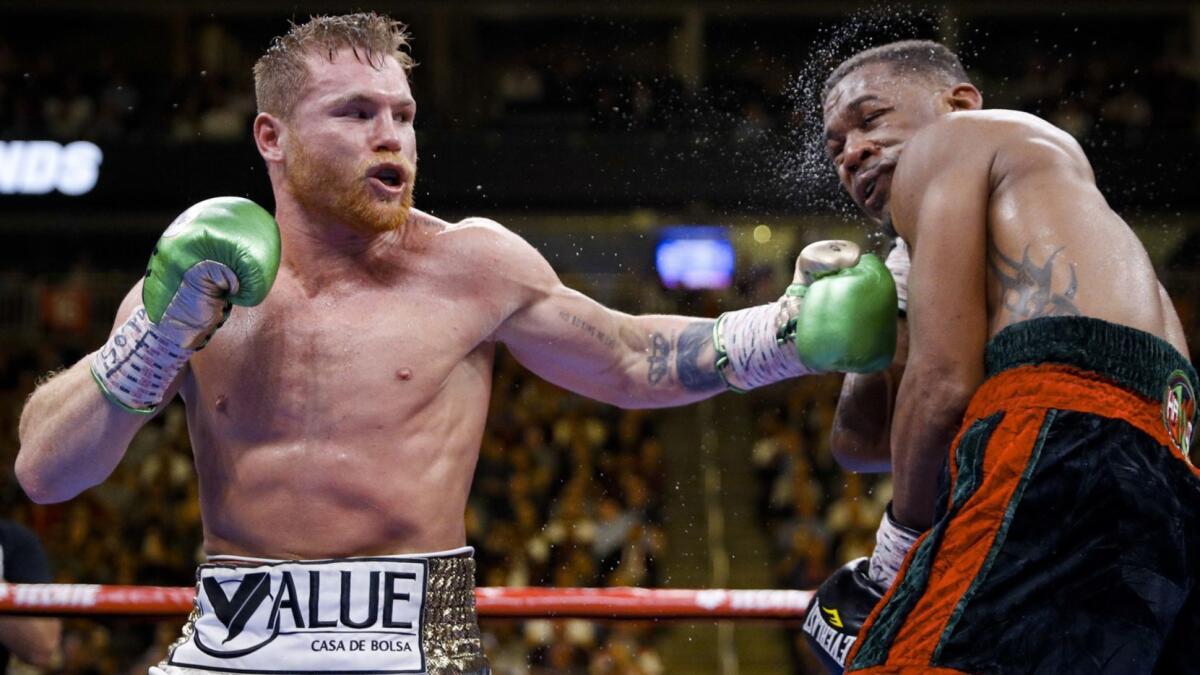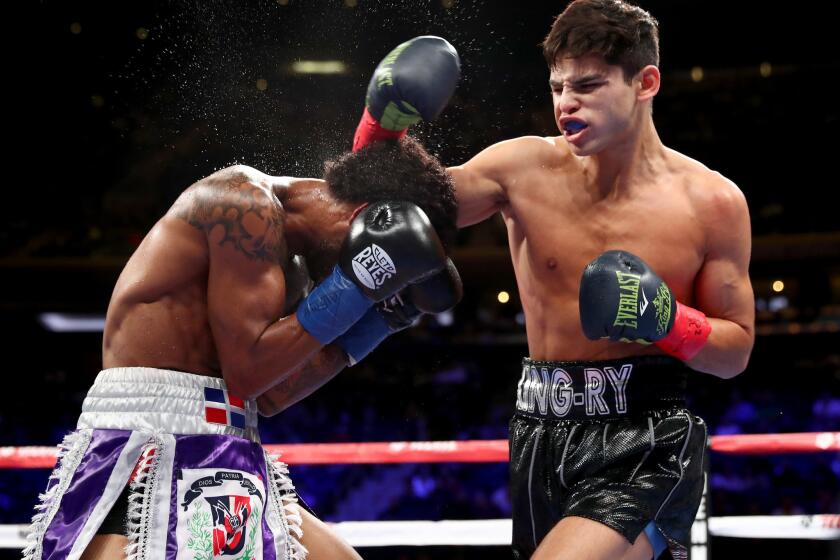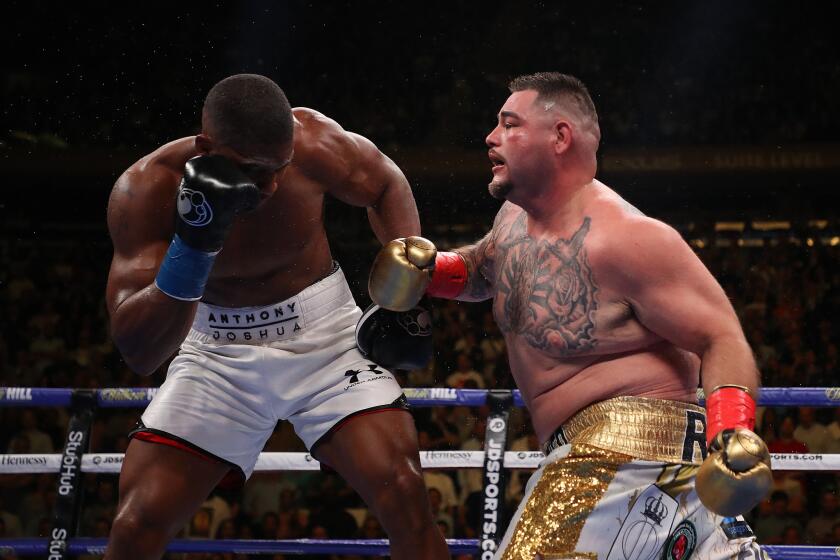Column: Boxing is dead and the sport has only its internal politics to blame

- Share via
Fans were invited to the news conference that was staged outside Staples Center the other day, but barely any of them showed up.
No mystery why.
The featured speakers were boxers. The public didn’t know they existed.
The intention here isn’t to denigrate the quality card that will be staged in the arena on Sept. 28. Rather, it’s to provide a snapshot of the state of the sport.
Boxing is dead.
Again.
And the sport has only itself to blame.
Three years ago, I pronounced boxing dead and predicted it was condemned to permanently remain on the fringes of the American sports landscape.
Nothing between now and then has changed my mind, but the sport did move in the right direction.
The most popular fighter on the planet, Canelo Alvarez, did move up in weight and did fight Gennady Golovkin.
Some interesting heavyweights did emerge on the scene, as they were able to compensate for their lack of in-ring know-how with a variety of other gifts: Deontay Wilder and Anthony Joshua with their devastating punching power, Tyson Fury with his oversized personality and Andy Ruiz Jr. with his hefty midsection.
Jaime Munguia (33-0) and Ryan Garcia (18-0) to headline the Mexican Independence Day fight card Sept. 14 in Carson.
Promoters did strike deals to place their fights not only on major networks such as Fox and ESPN, but also on newly launched online platforms such as DAZN and ESPN+.
However, boxing has once again proved to be boxing’s worst enemy, as the sport’s internal politics have prevented highly anticipated matches from materializing.
The momentum the sport gained over the last couple of years has vanished.
Alvarez never clearly defeated Golovkin — their first match was ruled a draw and Alvarez was awarded a controversial decision in the rematch — but he has moved on. Alvarez intensely dislikes Golovkin, enough to where he doesn’t want to give him the massive payday that would be part of a third fight.
Alvarez, who defeated Danny Jacobs in May in a match that failed to create much buzz, is now considering a list of capable but relatively anonymous opponents for his next fight, according to The Athletic.
Once viewed as an overhyped media creation, Alvarez reconstructed his image in recent years by taking on dangerous opponents such as Golovkin. His refusal to fight him a third time has made that goodwill disappear.
Wilder knocked down Fury twice in a dramatic draw at Staples Center last December, but, here, too, no rematch has taken place. The second go-around isn’t expected to happen until next year, after Fury takes on someone named Otto Wallin.
Andy Ruiz Jr., who stunned the boxing world with his victory over heavy favorite Anthony Joshua in June to take his titles, will try to repeat the feat in a Dec. 7 rematch in Diriyah, Saudi Arabia.
Joshua, a gold medalist for England at the 2012 Olympics, made his United States debut in June with the aim of becoming a household name in the American market. He was instead exposed in an upset loss to Ruiz, who is from Imperial.
Joshua’s promoter has struck a deal to stage the rematch in Saudi Arabia. Even if Joshua wins, the location will slow his efforts to become known in the United States. The same is true of Ruiz. His blubbery appearance garnered him some mainstream attention in the wake of his win over Joshua; building off that would be easier in the United States than it would be in the Middle East.
The decision to take the fight to Saudi Arabia has been criticized over the country’s human rights record, the murder of journalist Jamal Khashoggi, its treatment of the LGBTQ community and the war in Yemen.
In an interview with Fight Hub TV, promoter Eddie Hearn said the controversy was evidence that the fight is “absolutely massive.”
In England, maybe.
The absence of outrage in the United States reflects the reality that the majority of American sports fans have no idea who Anthony Joshua is or what he does for a living.
The situation could become even messier. Ruiz is contractually obligated to fight Joshua under conditions that were negotiated prior to their first fight — part of the deal was that Joshua controlled over where the rematch would take place — but is threatening to not to do so unless terms of his deal are improved.
Considering everything that hasn’t or won’t happen in boxing, the most significant card on the schedule could be the Sept. 28 show at Staples Center.
The small crowd at the news conference wasn’t a surprise. The fights are viewed as an opportunity to expose to a new audience welterweight champion Errol Spence, and, to a lesser degree, super middleweight champion David Benavidez.
“I’m finally getting the opportunity to fight the top guys, the top five guys in the welterweight division and make my name known,” said Spence, who will take on the pitbull-like Shawn Porter.
Nothing wrong with that. Shows like this are an important part of the sport’s ecosystem.
The problem is there is little else to look ahead to. Boxing can, but won’t, provide that.
More to Read
Go beyond the scoreboard
Get the latest on L.A.'s teams in the daily Sports Report newsletter.
You may occasionally receive promotional content from the Los Angeles Times.













